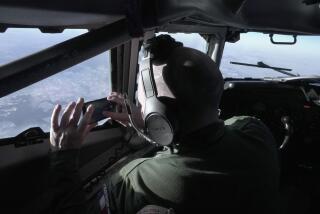Paris Plays Down New Libya Air Raid in Chad
- Share via
PARIS — French officials, anxious to avoid a direct confrontation with Libya in Chad, on Thursday dismissed as insignificant the latest reported Libyan bombing in southern Chad.
Defense Minister Andre Giraud said that on Wednesday, four Libyan MIG-23 fighter-bombers missed their target--the Chadian military post of Kouba Oulanga in southern Chad--and dropped their bombs instead in dunes three miles east of the village.
France has threatened reprisals against Libya for any military incursion into southern Chad, but Giraud said the French military does not intend to put its warplanes on the offensive “every time a bomb falls in the sand.”
Libya, which is supporting northern rebels against the French-backed Chadian government of President Hissen Habre, played down the raid even more by denying that it took place.
French officials insisted that it had, but they looked on the denial as evidence that Libyan leader Moammar Kadafi does not really want an escalation of the conflict with France in Chad, an impoverished country in north-central Africa.
Unsure of Kadafi
The French government was not sure, however, what to expect from the volatile Kadafi. His attitude, according to the influential French newspaper Le Monde, “defies Cartesian logic”--a reference to the 17th-Century French philosopher Rene Descartes.
This new tension between France and Libya is the result of a new twist in the long civil war in Chad. A split between a large segment of the rebels and the Libyans has enabled President Habre, with the help of increased French and U.S. military supplies, to move north in a campaign against rebel and Libyan posts.
This has led to an intensification of fighting and the resulting danger of drawing the French further into the conflict. On Sunday, in what looked like a frustrated attempt to embarrass the French, four Libyan MIG-23s attacked the village of Arada, which lies below the 16th Parallel and thus in the area where the French have said that Libyan activity will mean French retaliation.
French Attacked Radar
On Wednesday, 14 French Jaguars and Mirages flew over the Libyan air base of Ouadi Doum in northern Chad and fired missiles that, according to the French government, wiped out all the radar installations on the base.
The French retaliation was regarded as so mild that the Chadian government expressed “great disappointment” in it. One Chadian official said it was “like a sword thrust into water.” But France obviously hoped that its retaliation would end the matter.
A few hours later, however, Libyan planes dropped bombs near the village of Kouba Oulanga, and there were fears that the conflict between Libya and France was becoming more intense and direct.
But French officials, who insist that no French troops will be sent to fight in northern Chad, chose to play down the bombing, hoping that this might stop the escalation.
Libyan Raid Studied
Denis Baudouin, the spokesman for Premier Jacques Chirac, told reporters that although France still has a policy of retaliation, it is studying the latest raid closely to see whether it was a response to the French raid on Ouadi Doum or simply an attack that had been planned earlier. If the latter, Baudouin implied, the French will not regard it as an attempt to escalate the conflict.
Defense Minister Giraud told reporters that he does not think the Libyan attack was a response to the French raid. He said the Libyan planes, trying to attack President Habre’s forces in the north, might have flown into the south by mistake.
France keeps two dozen Jaguar and Mirage fighter-bombers at N’Djamena, the capital of Chad, and at nearby Bangui, the capital of the Central African Republic, as well as a force of 1,400 troops in Chad, a former French colony. French intelligence sources have estimated that Libya may have as many as 8,000 troops in northern Chad.
More to Read
Sign up for Essential California
The most important California stories and recommendations in your inbox every morning.
You may occasionally receive promotional content from the Los Angeles Times.









